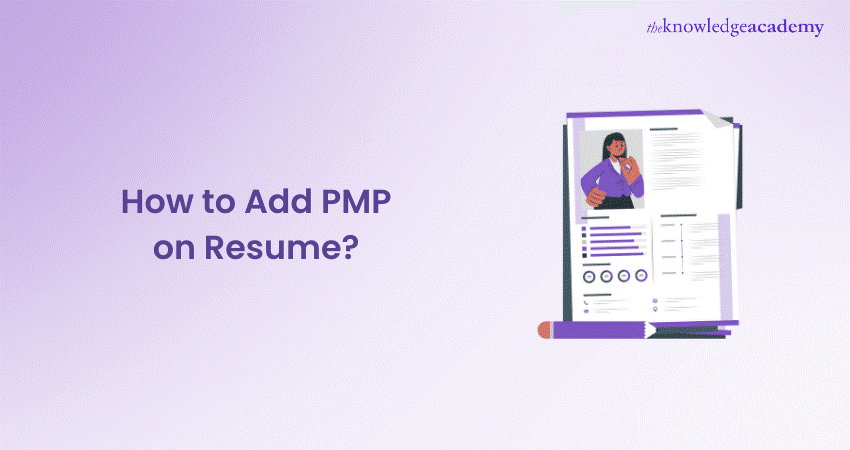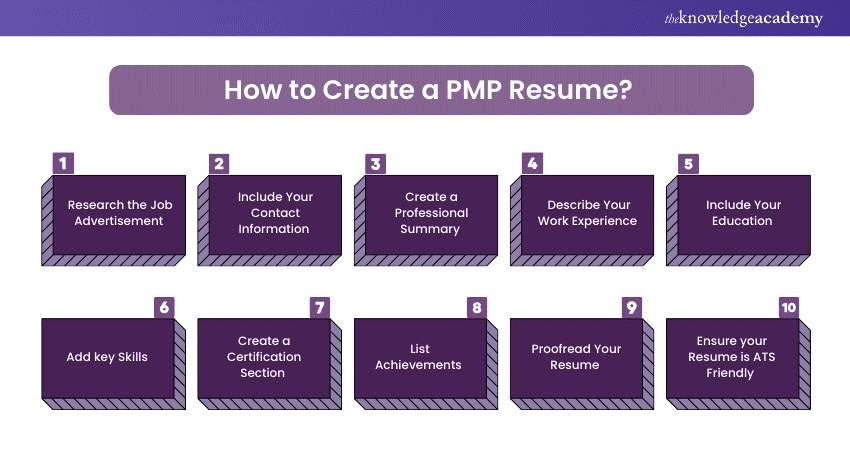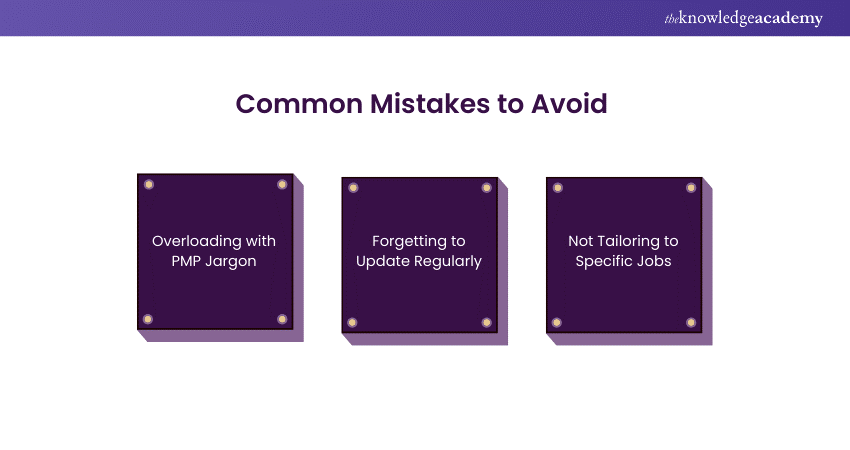We may not have the course you’re looking for. If you enquire or give us a call on 01344203999 and speak to our training experts, we may still be able to help with your training requirements.
We ensure quality, budget-alignment, and timely delivery by our expert instructors.

Looking to make your job application shine? Highlighting your PMP Certification on your resume can be a game-changer. This blog will show you the easy steps to highlight your PMP on Resume and grab the attention of Hiring Managers.
It doesn’t matter if you’re an experienced Project Manager or just starting out; we help you present your resume in a way that makes you stand out from the crowd. Ready to give your resume a boost? Let’s explore the straightforward tips for featuring PMP on Resume.
Table of Contents
1) What is a PMP Certification?
2) What is a PMP Certification Important?
3) How to Create a PMP Resume?
4) PMP Resume Template
5) Common Mistakes to Avoid
6) Conclusion
What is a PMP Certification?
The Project Management Professional (PMP) Certification is a globally recognised credential offered by the Project Management Institute (PMI). It demonstrates that you have the experience, education, and competency to lead and direct projects. To obtain a PMP Certification, you need to meet certain educational and professional experience requirements, and you must pass the PMP exam.
What is a PMP Certification Important?
A PMP Certification is highly valued in the Project Management field because it signifies a high level of expertise and dedication. It can open doors to more job opportunities, higher salaries, and career advancement. Employers often seek PMP-certified professionals because they are more likely to bring projects to successful completion on time and within budget.
Additionally, the PMP Certification enhances your professional credibility and shows your commitment to continued learning and professional development.
How to Create a PMP Resume?
Creating a PMP resume involves several key steps to ensure it highlights your certification and aligns with job requirements. Here’s a detailed list of how to do it:

1) Research the Job Advertisement
Before you start writing your resume, thoroughly research the job advertisement to understand what the employer is looking for. Identify the key skills and qualifications required and tailor your resume to match these criteria. Highlight your PMP Certification prominently if it is listed as a requirement or a preferred qualification.
2) Include Your Contact Information
At the top of your CV, include your full name, phone number, email address, and LinkedIn profile (if applicable). Make sure this information is accurate and professional. This section ensures that potential employers can easily reach out to you.
3) Create a Professional Summary
A professional summary is a brief statement at the beginning of your CV that highlights your key qualifications and career goals. Mention your PMP Certification here to immediately capture the employer’s attention. For example:
“Certified Project Management Professional (PMP) with over 10 years of experience in leading complex projects, driving process improvements, and ensuring successful project delivery.”
4) Describe Your Work Experience
In the work experience section, list your previous jobs in reverse chronological order, starting with the most recent. For each position, include the job title, company name, location, and dates of employment. Describe your responsibilities and achievements using bullet points and focus on how your PMP Certification has contributed to your success in these roles.
5) Include Your Education
List your educational background, including degrees earned, institutions attended, and graduation dates. If you have relevant coursework or honours, you can include them as well. This section should also mention any additional training or certifications related to Project Management.
6) Add key Skills
Highlight key skills that are relevant to the job you are applying for. This can include technical skills, such as proficiency in Project Management software (e.g., Microsoft Project, Asana), as well as soft skills like leadership, communication, and problem-solving. Make sure to include skills that are specifically mentioned in the job advertisement.
7) Create a Certification Section
Create a separate section on your resume to list your PMP Certification and any other relevant certifications. Include the name of the certification, the issuing organisation (PMI), and the date you obtained it. For example:
a) Project Management Professional (PMP), Project Management Institute (PMI), June 2024.
8) List Achievements
Include a section for your achievements, such as awards, recognitions, or notable accomplishments in your career. This section can help set you apart from other candidates by showcasing your successes and contributions to previous employers.
9) Proofread Your Resume
Carefully proofread your resume to ensure there are no typos, grammatical errors, or formatting issues. A well-polished resume reflects your attention to detail and professionalism. Consider asking a friend or colleague to review your resume for additional feedback.
10. Ensure your Resume is ATS Friendly
Many companies use Applicant Tracking Systems (ATS) to screen resumes before they reach Hiring Managers. To ensure your resume is ATS friendly, use standard fonts and formatting, include relevant keywords from the job advertisement, and avoid using images or complex graphics. This increases the chances that your resume will pass through the ATS and be seen by a recruiter.
Learn how to apply a quality and integration management plan with our CAPM Certification – join today!
PMP Resume Template
Consider this example as a reference to create your PMP resume:
|
Name: [Your Name] Location: [Your Location] Email Id: [Your Email] LinkedIn Profile: [Your LinkedIn Profile] Project Management Professional (PMP) Experience: Over [X] years Expertise: Leading cross-functional project teams, managing project scope, time, and cost, implementing Project Management methodologies, and ensuring successful project delivery. Career Experience Senior Project Manager • [Date] – Present [Company Name] a) Led multiple projects simultaneously, ensuring timely delivery and adherence to budget and scope. b) Developed project plans, schedules, and budgets, and tracked progress against milestones. c) Coordinated with stakeholders and project teams to identify risks and develop mitigation strategies. d) Conducted project reviews and provided detailed reports on project status and performance. Project Manager • [Date] – [Date] [Company Name] a) Managed end-to-end project lifecycle for various projects, ensuring alignment with business objectives. b) Utilised Project Management software to monitor project progress and resource allocation. c) Facilitated communication between project teams, clients, and senior management. e) Implemented best practices in Project Management to improve efficiency and effectiveness. Assistant Project Manager • [Date] – [Date] [Company Name] a) Assisted in planning and executing projects, ensuring adherence to Project Management methodologies. b) Coordinated project activities and schedules to ensure timely completion. c) Supported Project Managers in preparing project documentation and reports. d) Monitored project performance and provided recommendations for improvements. Skills a) Project Planning b) Risk Management c) Budget Management d) Resource Allocation e) Stakeholder Management f) Agile and Scrum Methodologies g) MS Project h) JIRA Education M.Sc. in Project Management from [University Name] | [Year] B.Sc. in Business Administration from [Institute Name] | [Year] Certifications 1) Project Management Professional (PMP), Project Management Institute (PMI), [Year] 2) [Other relevant certification], [Issuing Organisation], [Year] Languages 1) [Language Name 1] 2) [Language Name 2] |
Common Mistakes to Avoid
Even with a strong PMP Certification, certain mistakes on your resume can hinder your chances of landing a job. Here are some of them:

a) Overloading with PMP Jargon: While it’s important to highlight your PMP Certification, avoid filling your resume with too much jargon that may not be understood by non-specialist recruiters.
b) Forgetting to Update Regularly: Ensure your resume is up to date with your latest achievements, skills, and job experiences.
c) Not Tailoring to Specific Jobs: Customise your resume for each job application to highlight the skills and experiences most relevant to the job description.
Learn foundational Project Management skills with our PMI Project Management Ready Course – join today!
Conclusion
Adding your PMP Certification to your resume can greatly improve your job opportunities and show your expertise in Project Management. By following these guidelines, you can create a strong PMP vs. MBA resume that highlights your skills, experiences, and qualifications. Highlighting the PMP on your resume will help you stand out in the competitive job market and demonstrate your dedication to professional development.
Gain knowledge of agile methodologies with our PMP Certification – join today!
Frequently Asked Questions
What is the Pass Rate for PMP?

The pass rate for the PMP exam is not officially published by PMI, but it is estimated to be around 60-70%. This means that about 60-70% of test-takers pass the exam on their first try.
How Long is PMP Valid?

The PMP Certification is valid for three years. To maintain the certification, you need to earn 60 Professional Development Units (PDUs) within that period and apply for renewal.
What are the other resources and offers provided by The Knowledge Academy?

The Knowledge Academy takes global learning to new heights, offering over 3,000 online courses across 490+ locations in 190+ countries. This expansive reach ensures accessibility and convenience for learners worldwide.
Alongside our diverse Online Course Catalogue, encompassing 19 major categories, we go the extra mile by providing a plethora of free educational Online Resources like News updates, Blogs, videos, webinars, and interview questions. Tailoring learning experiences further, professionals can maximise value with customisable Course Bundles of TKA.
What is The Knowledge Pass, and How Does it Work?

The Knowledge Academy’s Knowledge Pass, a prepaid voucher, adds another layer of flexibility, allowing course bookings over a 12-month period. Join us on a journey where education knows no bounds.
What are Related Courses and Blogs provided by The Knowledge Academy?

The Knowledge Academy offers various PMP® Training, including the PMP® Certification, Portfolio Management Professional PfMP® Certification, and PMI Project Management Ready Course. These courses cater to different skill levels, providing comprehensive insights into PgMP vs PMP.
Our Project Management Blogs cover a range of topics related to Project Management, offering valuable resources, best practices, and industry insights. Whether you are a beginner or looking to advance your Project Management skills, The Knowledge Academy's diverse courses and informative blogs have got you covered.
Upcoming Project Management Resources Batches & Dates
Date
 PMI Project Management Ready
PMI Project Management Ready
Fri 6th Jun 2025
Fri 15th Aug 2025
Fri 10th Oct 2025
Fri 5th Dec 2025






 Top Rated Course
Top Rated Course



 If you wish to make any changes to your course, please
If you wish to make any changes to your course, please


